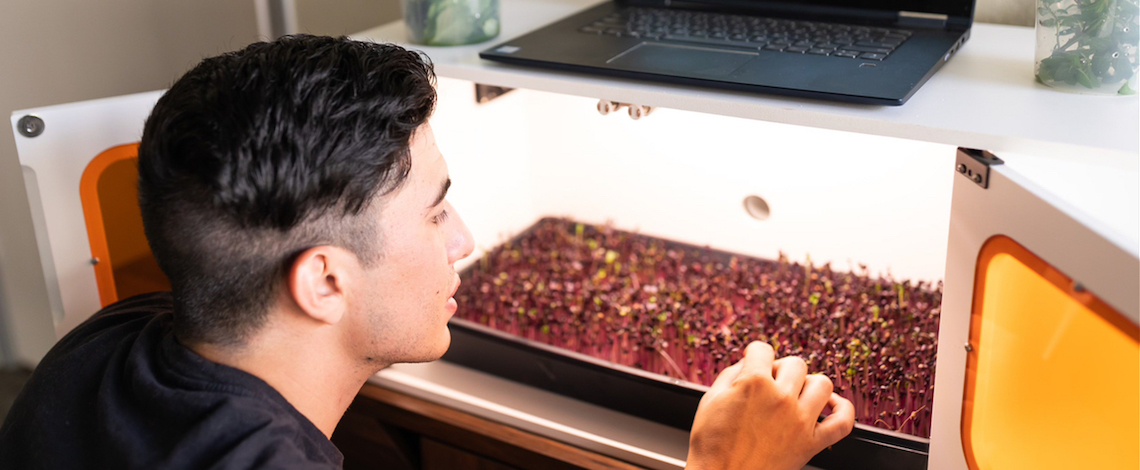
Ethan Mora is an attorney, blockchain expert, inventor and founder of the company Vertical AgriTech Inc., a Fresno-based startup that hopes to commercialize the "Alchemist," a self-contained plant growing module. Photo contributed
Written by Frank Lopez
The convergence of food and technology in everyday life is more apparent now than at any other point in human history.
In just a few seconds, people can look up any recipe or cooking video. Online food ordering and delivery platforms such as DoorDash and UberEats have become household names since they were founded nearly eight years ago.
More Americans have been planting their own home gardens, and according to a report from market research firm Packaged Facts, 26% of surveyed U.S. consumers said they are planting a food garden because of the pandemic.
Computers and the cloud are changing the way crops are irrigated, seeds are germinated, livestock is tracked and much more.
A local startup — part of Fresno State’s Water, Energy, and Technology (WET) Center’s business accelerator program called Valley Ventures — is utilizing all of these innovative and developing methods for their own home garden product.
Based in Fresno, Vertical AgriTech Inc. is an agtech startup developing cultivation software and smart devices for Controlled Environment Agriculture (CEA). The team at Vertical AgriTech have developed a flagship product, the “Alchemist,” a programmable indoor garden.
The company is part of Valley Venture’s sixth cohort since it began in 2017. Companies in the accelerator program receive mentorship experiences and engagement opportunities with industry leaders in ag and technology.
CEO Ethan Mora is an attorney, blockchain expert, inventor and founder of the company with renowned chef and CIO Cassidy Hallman and computer scientist and CTO Allesandro Bassi.
The “Alchemist” connects to Vertical AgriTech’s proprietary web application, “Room2Table,” which allows “tastemakers” (subscribers) to visually monitor and control the indoor garden from anywhere in the world and interact with other tastemakers.
Tastemakers could be people who are growing in their own home or restaurants that are growing on premises.
“These technologies are really the foundation upon which we’re building a data driven, self-reliant food community that’s capable of quickly exchanging information across the globe while also producing exciting, nutritious ingredients hyper-locally,” Mora said.
Mora said that Fresno was the perfect starting ground for the company. As a Fresno native, he wanted to move back to the Central Valley with the ultimate goal to create a decentralized farming community based around its network of programmable, modular, affordable, and aesthetically pleasing indoor gardens that are space and resource efficient.
The “Alchemist” is not currently commercially available, but in beta testing stages with a dining establishment in Hollywood and some mushroom farmers in Seattle.
There are plans to debut the indoor garden in a Fresno restaurant in three months, and with some gardeners to work out some kinks and improve the user experience.
Mora said he has always had an interest in finding solutions for complex problems.
In law school, Mora got really into cryptocurrency and once he started working at a law firm, he was the resident expert for emerging issues in that space.
Eventually Mora started his own firm and was able to work on some complex cryptocurrency litigation, but he realized that the issues that he wanted to find solutions for would not be in crypto.
Mora became aware of supply chain issues and blockchain products that were working on addressing those issues in the food and agriculture space. He reached out to friends on his idea of using blockchain to improve the food supply chain and make the exchange of local suppliers and sellers more efficient.
Mora had met Vertical AgriTech CIO Hallman through friends of his wife. Last year he asked Hallman if he had any experience with microgreens. It turned out Hallman had worked with microgreens while employed at the 5-star hotel Pulitzer Amsterdam in the Netherlands.
Hallman develops recipes that are coordinated with harvest schedules and creates engaging content that shows people that chefs can easily grow their own microgreens.
The team expects to be able to expand the technology to large-scale operations such as greenhouses and is working on that aspect through the Valley Ventures program.
The team is working on getting the costs of the “Alchemist” lower and see it used in schools to help more people gain access to healthy foods.
There is anticipation that the “Alchemist” will be able to be incorporated on platforms such as Amazon Alexa or Google Home so a subscriber can check on their garden.
There are some microgreens farmers in town and the team wants to partner with companies such as Central Valley Mushrooms to get them to use their camera module to be able to advertise their products directly to consumers and restaurants.
In about six months Mora expects to have an industrial design plan to produce the “Alchemist” at a larger scale.
“Our goal is really to show everyone that they could be a farmer and enjoy growing with us as part of our tastemaker community,” Mora said.







